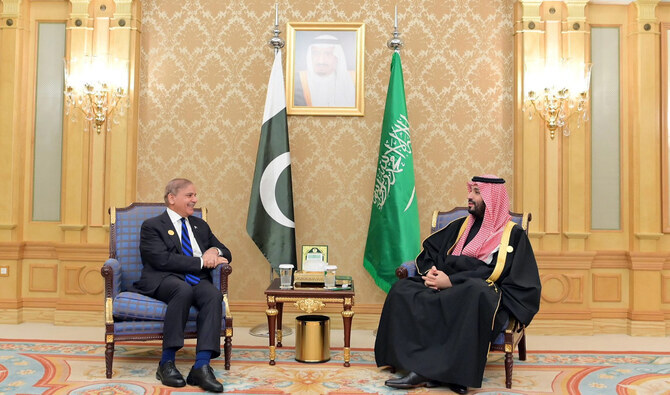ISLAMABAD: Pakistani business leaders, experts and officials this week hailed Islamabad’s growing economic partnership with Saudi Arabia, saying it was high time the two countries transformed their close ties into a robust and mutually rewarding economic partnership.
Prime Minister Shehbaz Sharif on Wednesday concluded a two-day visit to Saudi Arabia where he met Saudi Crown Prince Mohammed bin Salman on the sidelines of the One Water Summit in Riyadh. During the visit, Sharif met the crown prince for the fifth time in six months, during which both sides agreed to bring about a qualitative change in bilateral ties and expressed satisfaction over the pace of implementation of $2.8 billion agreements signed between the two countries.
Pakistan has pushed in recent months to strengthen trade and investment ties with friendly nations, particularly the Kingdom, which has promised a $5 billion investment package that cash-strapped Islamabad desperately needs to shore up foreign reserves and fight a chronic balance of payment crisis.
The Prime Minister’s Office (PMO) said in a statement this week that seven out of 34 MoUs valued at $2.8 billion and signed earlier this year with Saudi Arabia have been converted into agreements worth $560 million.
“This is high time to transform the Pakistan-Saudi relationship into a stronger economic partnership, especially following the recent increase in high-level leadership contacts and exchanges of business delegations,” Fahad Barlas, chairman of the Pakistan Association of Exhibition Industry, told Arab News on Wednesday.
Barlas organized the second Pakistan Investment Summit in Jeddah on Nov. 30 under the Pakistan Association of Exhibition Industry. The event featured 31 Pakistani companies from various sectors and was attended by prominent traders, investors, and community figures.
“We brought together 31 Pakistani companies, all of which received promising leads, with around 20 of them expected to convert into tangible collaborations and deals worth over $25 million,” he disclosed.
He said five MoUs were signed at the event, adding that the major companies that signed deals included real estate developers such as Exotica, ParkView City, and the Defense Housing Authority.
Pakistan and Saudi Arabia’s growing closeness and business ties have translated into higher trade between the two countries.
“In FY 2024, Pakistan’s trade volume with Saudi Arabia reached $5203.19 million marking an increase from $5010.47 million in FY 2023,” the Pakistani mission in Riyadh told Arab News.
It said that from July to October during the current financial year, Pakistan’s trade volume with Saudi Arabia has already reached $1,577.85 million. Meanwhile, Pakistan’s total exports to Saudi Arabia were recorded at $710.29 million for FY 2024, up from $503.85 million in FY 2023.
“Pakistan’s exports to Saudi Arabia for the period from July to October current FY 2025 amounted to $245.56 million, compared to $214.98 million during the same period in FY 2024, reflecting a notable increase,” the embassy added.
The mission said Pakistan’s IT exports registered a “significant growth” of over 48 percent in FY24, increasing from $31.67 million in FY 2023 to $47.09 million. Pakistan’s services exports to the Kingdom increased by 20 percent, rising from $346.88 million in FY 2023 to $417.94 million in FY 2024.
“Pakistan’s services exports to Saudi Arabia for the period from July to October FY 2025 reached $151.21 million, compared to $132.54 million during the same period in FY 2024, reflecting a growth in exports,” it added.
The mission said Pakistan’s main exports to Saudi Arabia included cereals, meat and beef, textiles, knitted garments, cotton fabrics, beverages, spices, fruits and vegetables, fish and fish products, light engineering goods, leather products, towels and organic chemicals.
KINGDOM ‘MAJOR INVESTOR’ IN PAKISTAN
Khaqan Najeeb, former adviser to the finance ministry, said Pakistan’s relationship with Saudi Arabia was now emerging in investment and trade, particularly focused on science, technology, IT, mining sector and agriculture areas.
“It would be important to say that at the time when Pakistan needed the required gross external financing needs to be fulfilled, Saudi Arabia was a key player to ensure its deposits in Pakistan,” he told Arab News.
Najeeb said it was good to see agreements worth $560 million signed with Saudi Arabia were now being implemented, signaling a positive progress in bilateral business relations.
“The recent interaction will boost the confidence of the Saudi government and hope to see the crown prince visiting Pakistan to conclude some of the ongoing talks around the mines and mineral sector in Pakistan,” he said.
Javed Hafeez, a former Pakistani diplomat, said the impact of the increased Pakistan-Saudi Arabia leadership-level contacts on investment and trade would be “positive.”
“The Kingdom of Saudi Arabia is a major investor in Special Investment Facilitation Center (SIFC) and its related projects, especially in agriculture and in mining,” he told Arab News.
Pakistan formed the Special Investment Facilitation Council (SIFC), a hybrid civil and military body, in 2023 to fast-track decisions related to foreign investment in its key economic sectors such as agriculture, mining, minerals, tourism and others.
He said that the five meetings between Sharif and the Saudi crown prince in six months highlighted both sides’ mutual desire for frequent consultations, especially as the region undergoes turbulence.
“In terms of peace and security, Saudi Arabia and Pakistan, as close allies, regularly consult each other at key junctures, given their shared responsibility for peace in the Middle East,” Hafeez said.



















